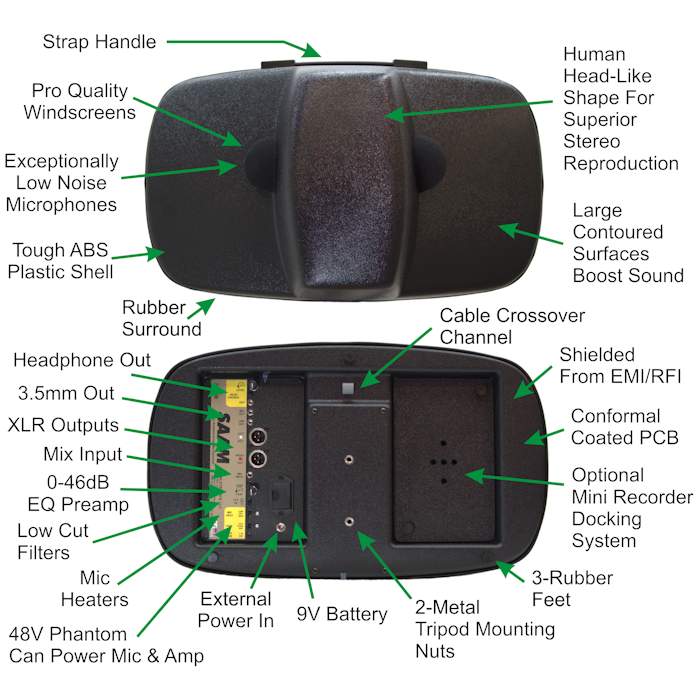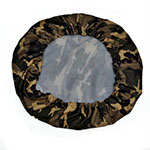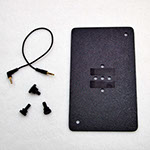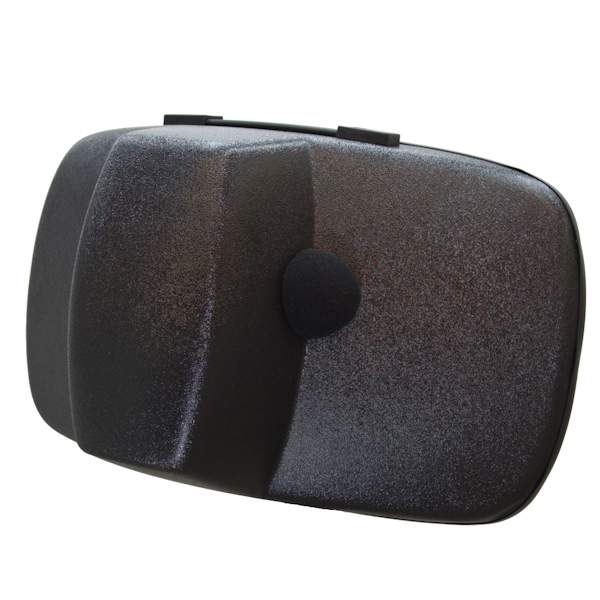
Wildtronics Stereo Ambient Array Microphone
Exceptional low noise, human head based stereo microphone.
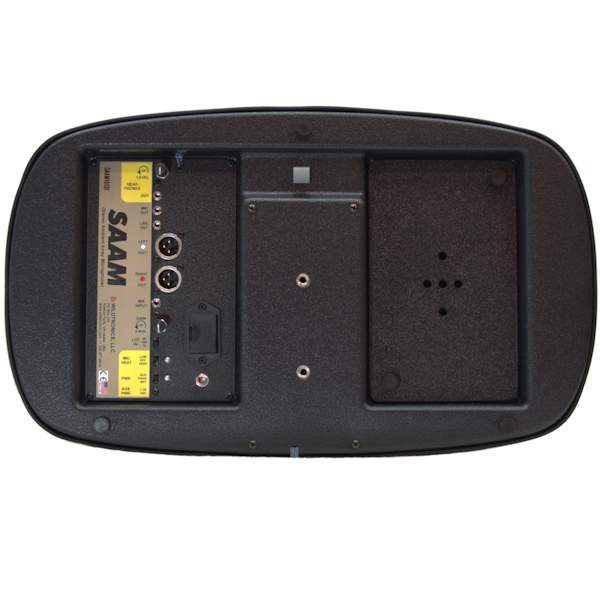
Rear view of the Wildtronics Stereo Ambient Array Microphone
Shown with the Recorder Dock accessory installed.
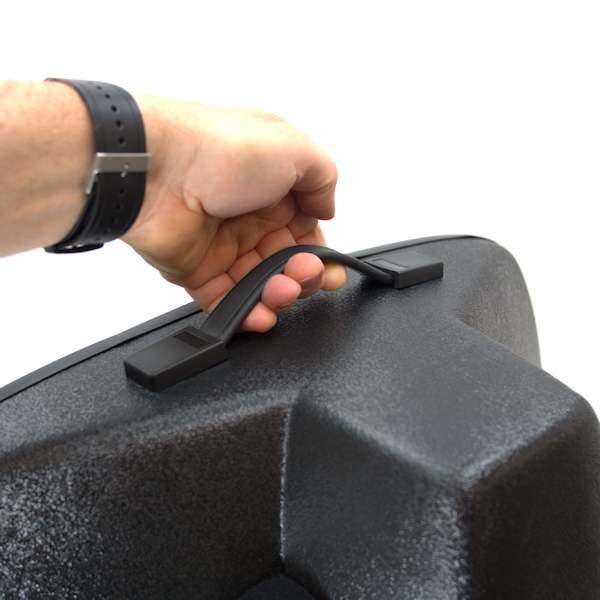
Convenient carry handle built-in.
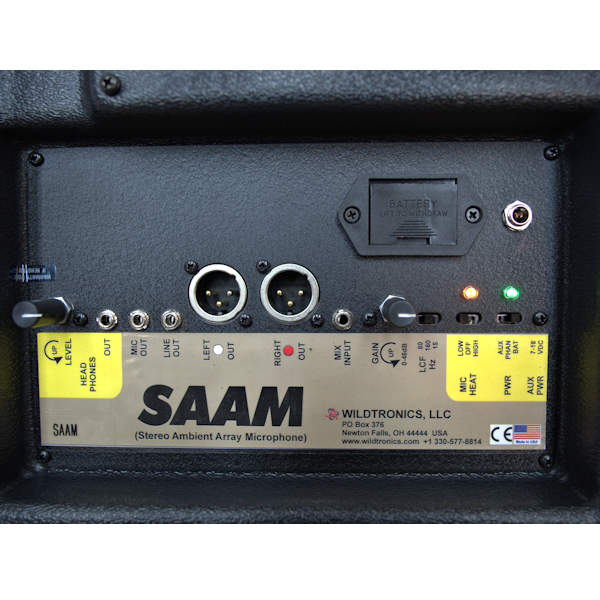
Back panel of the SAAM
XLR, 3.5mm, and even headphone outputs powered by phantom or replaceable 9 volt battery
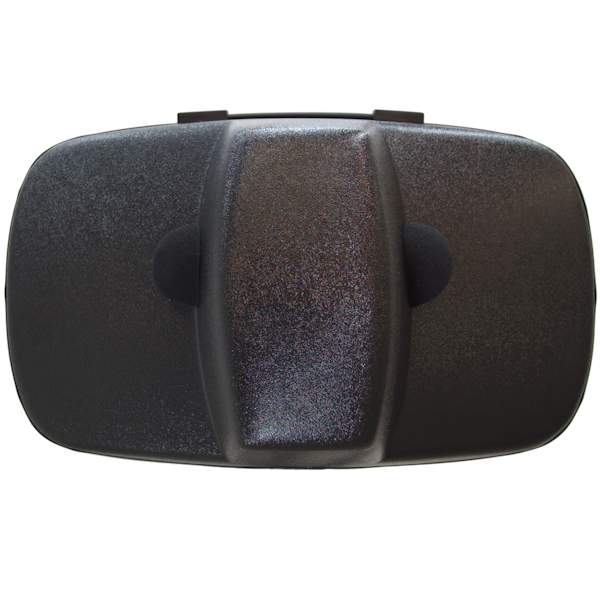
Front face of the Stereo Ambient Array Microphone
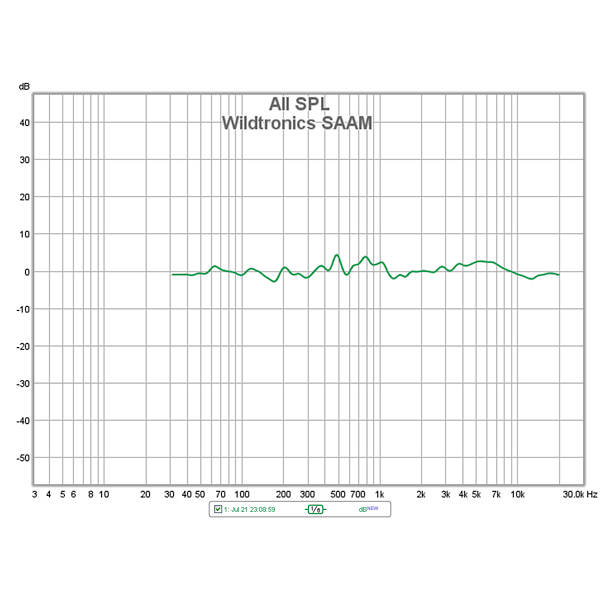
The frequency response of the Wildtronics SAAM microphone.
Internally equalized frequency response with selectable high pass filters built-in.
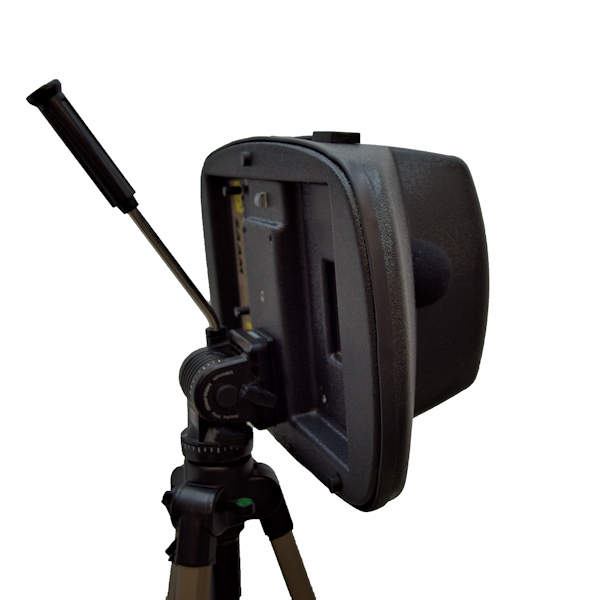
The Wildtronics SAAM microphone being used in the vertical stereo mode.
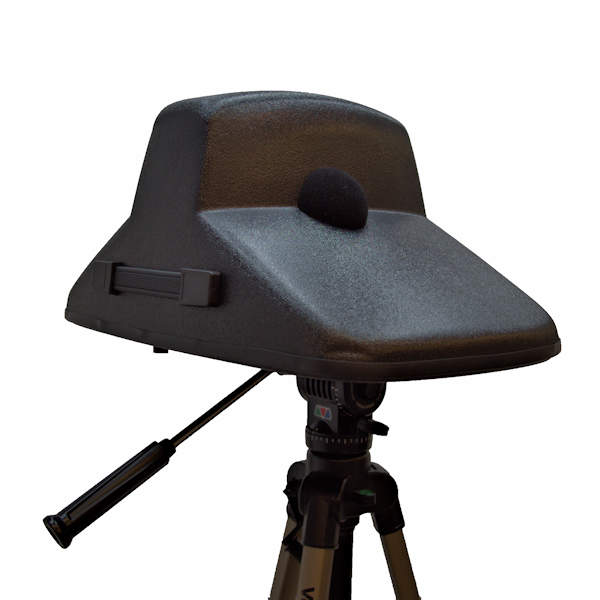
The Wildtronics SAAM microphone being used in the up-right, binaural microphone mode.
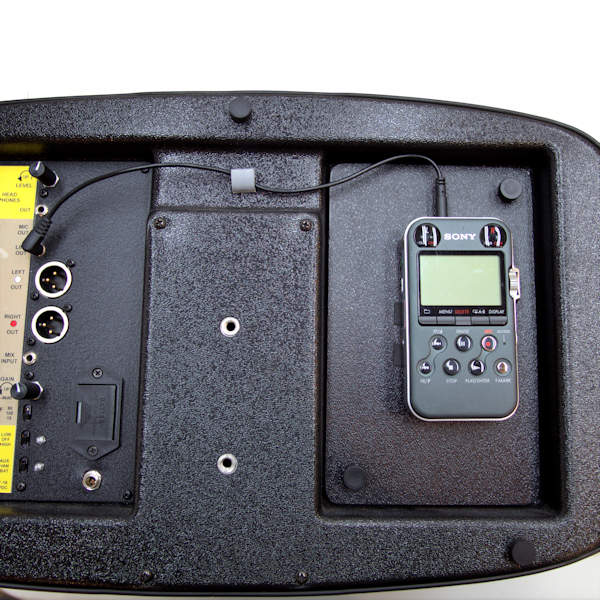
Small recorders can be mounted using the Recorder Dock accessory.
The Recorder Dock accessory is purchased separately and is not included with the SAAM.
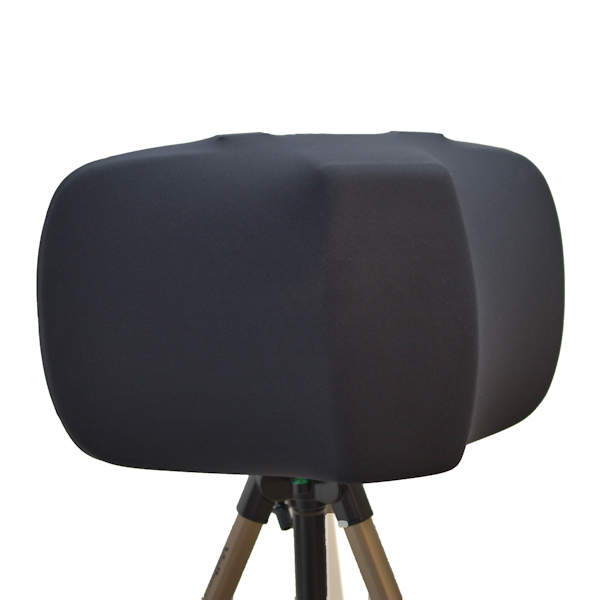
Shown with the black SAAM Secondary Windscreen accessory.
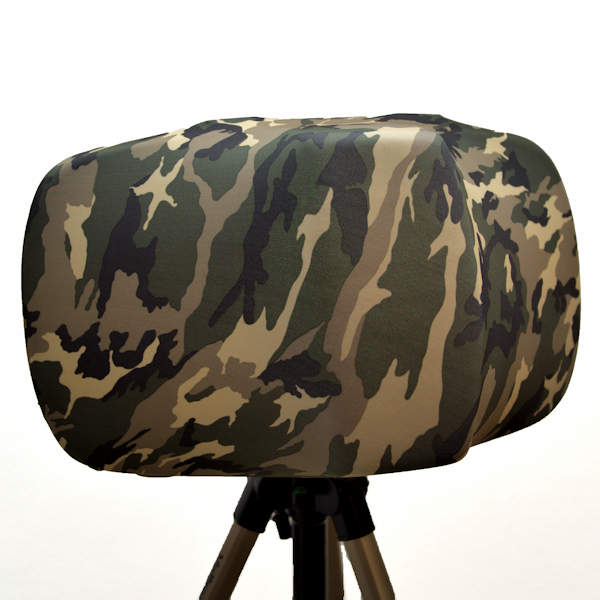
Shown with the camo SAAM Secondary Windscreen accessory.
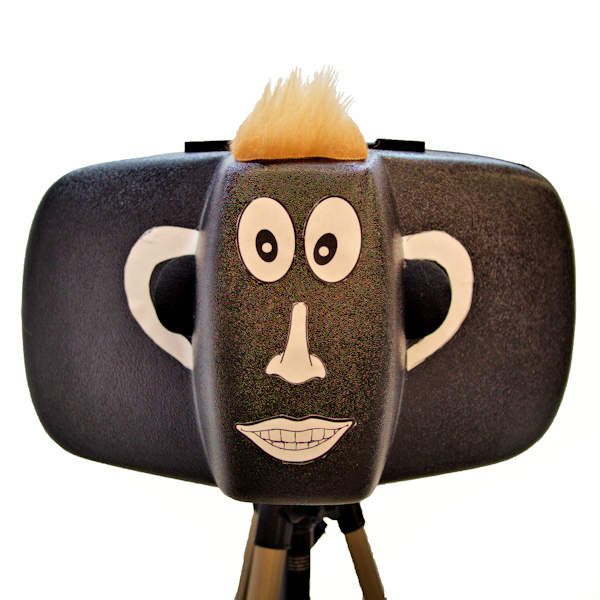
The SAAM is derived from an enhanced human head model, big ears.
This enhanced model produces great stereo separation, while increasing acoustic gain.
Previous Next
The SAAM is very easy to use. Most other stereo recording setups using two microphones, like ORTF, XY, or Jecklin disk, need specific angles to be set with the use of mounting bars. The SAAM is ready to go instantly. Just mount the SAAM to a tripod, lay it on a flat surface, or even handhold it, and you are ready to record. Plus, the SAAM has improved stereo separation over the other methods of stereo recording, very similar to what you actually hear with your ears in person. The Wildtronics SAAM is both easy to use and the most capable system available for stereo field recording.
The SAAM is extremely low noise, providing excellent range in even the quietest environments. There are very few individual microphones that have lower noise, but those mics won't perform as well as the SAAM system when used in a stereo configuration. The SAAM has superior, and natural stereo separation similar to a human head model with much larger ears. If you cup your hands behind your ears, notice that you hear better. The SAAM enclosure has a similar effect, it increases the acoustical gain, which further lowers the apparent noise. The built-in, low noise preamps can further increase the signal level so even low cost recorders are able to produce exceptional results. If you already have a good, professional recorder, the SAAM has XLR outputs as well. We always recommend using plenty of the SAAM preamp gain for best results.
The SAAM has similarities to other types of stereo boundary array or pressure zone (PZM) microphones, such as DIY PZM plates made from wood or modified Crown SASS microphones. A boundary surface captures and increases the sound wave intensity at the microphone element. The size of the boundary plate directly determines the low frequency response – bigger the better. The number of boundary plates that intersect at the microphone determines the gain of the system. The SAAM enclosure is larger for better low frequency gain and specially shaped to obtain additional gain. This means that you will get more gain over a wider frequency range, providing a lower noise floor and optimal stereo separation. The SAAM includes built-in preamps, and most importantly, includes built-in equalization circuits to obtain a flat frequency response. Whenever a boundary surface is near a microphone, the frequency response is heavily altered. Some boundary's are so small that they have only a minor effect, just boosting higher frequencies. Using a substantial boundary near a microphone will require a test to determine the frequency response. A post edit EQ curve must then be applied to every recording made with that boundary. The Wildtronics SAAM has the EQ curve built-in, so you won't need any EQ post editing, and recordings will sound very natural.
The SAAM is designed for field recording. The connectors and switches are brands professionals can rely on. Electronic components were selected to meet outdoor temperature requirements. The PC board is conformal coated to reduce moisture issues. The outer shell is made of tough ABS plastic that is internally dampened to suppress resonance. The circuits are shielded, with metal coating, to eliminate potential problems with EMI/RFI. For long recording sessions, an external power connector can be used. If you are ever in extremely humid conditions, we have included microphone heaters, that may be turned on to help displace condensation from affecting the microphones. You may never need them, but they are there if you do. Microphone heaters are used in specialized microphones that are designed for outdoor use. The pro quality windscreens work very well up to around 12-15MPH, and we have a Secondary Windscreen accessory that can further improve that. The XLR outputs are transformerless, buffered, low impedance, and suitable for driving long cable runs.
There are two main methods of using the Stereo Ambient Array Microphone. Using the SAAM with the "nose" pointed in the general direction of the subjects, is for general purpose stereo recording. This is the most often used method, and is useful when you need to reject sounds from the rear, in favor of the intended subjects in front of the SAAM. You can also point the "nose" straight up, resulting in a 360 degree stereo recording. The 360 degree method works especially well if you have lively sounds from a tree canopy, are picking up conversations in a room or meeting, or want maximum coverage for surveillance use.
With the optional Mini Recorder Docking Plate, you can directly mount a small recorder to a recessed area on the back of the SAAM. The internal, very low noise preamps boost the signal so you can use low cost recorders, such as a Tascam DR-05x or Zoom H1n and obtain low noise, professional quality recordings. Turn the gain down on your recorder and use the preamps in the SAAM to set the gain for best results. The Docking Plate comes with a 12-inch 3.5mm cable to connect the SAAM's 3.5mm line output to your recorder. The plate is designed for use with the 1/4-20 tripod mount on the back of many recorders. This makes an incredibly portable recording rig with no dangling cables, that is very easy to transport.
The Wildtronics family of microphones were developed by Bruce Rutkoski, who has professionally recorded nature sounds for over 20 years and originated new recording techniques, in addition to an electronic and mechanical engineering background. Bruce's recordings are available through Natureguy Studio in CD and MP3 formats.
Click here for the Wildtronics SAAM Microphone manual.
Here are some sample recordings using the SAAM. The samples have been processed with level normalization (gain increase). No noise reduction was done. Note: the frog recording sample was made from 15-1200 feet away from the frogs, and note the stereo separation and clarity even at low frequencies.
Below is a sample recording using the SAAM and a low cost, handheld recorder of a relatively quiet dawn chorus. This recording was edited with some compression and a special noise reduction technique to nearly eliminate any trace of system noise to showcase the incredible ability of the SAAM to record even distant, faint birds. This recording represents "hearing" better than a good human ear could hear at the location. Listen to the recording for a while. It starts out with Whippoorwills that are hundreds of yards away, they get closer later in the recording along with some other birds as the sun rises.
Below is the general video presentation of the Wildtronics Stereo Ambient Array Microphone (SAAM), describing the features.
Frequency response: 20-20kHz
Basic Dimensions: 19x11.25x8.25 inches Weight: 2 lbs 11ozs
Sensitivity @ gain of 1: -23dB @1V/Pascal or 70mV/Pascal
Max SPL: 115dB @ 0dBu Output; 125dB @ +10dBu Output
Signal to Noise Ratio: 86dB Self Noise: 8dBA *
Preamp Gain: 1-46dB Preamp EIN: -129dBA
Headphone Gain: -15dB to 30dB (referenced to the XLR output)
Mix Input: 3.5mm Stereo Line Level, 6dB gain to output – 1K Ohm
Outputs::
Buffered XLR; +10dBu max output, 130 Ohm
3.5mm Stereo Line Jack (-12dB referenced to XLR), 1K Ohm
3.5mm Stereo Mic Jack(-24dB referenced to 3.5mm Line), 65 Ohm
3.5mm Stereo Headphone Jack
Powered By Any One of:
2 Channel, 48 Volt Phantom Power, 10mA/Channel max
9 Volt Battery, Rechargeable Lithium Recommended
7-18V DC External Power, 5x2.5mm DC Power Jack, Center (+)
Current Draw: 14mA, Using Headphones: 18mA, Using Low Mic Heat: 31mA, Using High Mic Heat: 65mA
9 Volt Alkaline Battery Life:
40 hours using microphones only
25 hours using microphones and headphones
15 hours using microphones and low microphone heater
7 hours using microphones and high microphone heater
Other Specs
XLR Connectors: Neutrik Gold Plated
3.5mm Connectors: Switchcraft
External DC Jack: Switchcraft
Metal Tripod Thread: 1/4-20
Internally Shielded from EMI/RFI with a nickel coating on the plastic
Maximum Docking Compartment Dimensions: 5.0x 7.0 inches
Low Cut Filters: 15, 80, 160 Hertz, 6dB per octave
*Most noise is above 10KHz and may be post filtered, for an equivalent system noise of 4dBA.
Click here for a Wildtronics SAAM Microphone Manual.
The most popular Accessories are listed here. Please visit our Web Store for ordering. Select the main product type and then select the Accessory tab in that section to find all the accessories for that product group.
SAAM Secondary Windscreen
This sock-like cover stretches over the front of the SAAM Microphones and extends use in winds up to 20 MPH. It is available in Black or Camo color. Without this additional windscreen, wind protection is good for winds up to 10-12 MPH using the primary windscreens included with each microphone. The material may be sprayed with silicone waterproofing spray, when off of the microphone, to increase the weather resistance of the microphone.
SAAM Recorder Dock Kit
This accessory allows you to mount a small recorder directly in a recessed area of your Wildtronics SAAM microphone. It includes a 1 foot cable with 3.5mm connectors. This Docking Kit allows for a very portable, cable free system.
